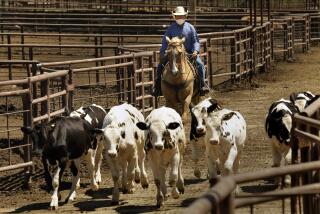Opinion: Paleo debate: Should we eat like cavemen -- assuming we could?
- Share via
During a visit this year to Greenland, I took a hike to a spot known as the suicide cliff, where more than 1,000 years ago, elderly Inuit people would throw themselves to their deaths when they had become more of a drag on their community than a contributor to it.
As sad and bygone as that phenomenon is, it might have a message for us, here and now, not just as a sociological matter, but as an issue to ponder when we consider the Paleo diet.
The Paleo diet?
This way of eating, with its emphasis on plenty of protein, especially animal protein, along with vegetables, surged in 2014 amid some studies that have been finding good weight-loss and health outcomes from lower-carb diets. Fats, perhaps even saturated fats, are not the dietary demon they used to be considered, some researchers and writers suggest. Paleo’s popularity superheated the debate—low-fat or low-carb?—that has been simmering ever since the peak of the Atkins diet. Renowned food writer Michael Pollan fired the first salvo of 2014 at the beginning of the year, with a treatise in Mother Jones on why Paleo was a bad idea, though his attack mischaracterized the diet in several ways.
One of the big beliefs of Paleo followers is that this way of eating is more natural to man, the way our cave-dwelling forefathers ate. And one of Pollan’s primary counterpoints was that it’s not at all clear that this represents the kind of food that prehistoric types found or chose. Even if it were, he pointed out, the composition of the meat consumed thousands of years ago, obtained via the hunting of wild animals who themselves browsed on largely uncontaminated plants, would surely have been far different from the meat from domesticated animals that we purchase today.
It will take many years for science to sort this out, if it ever really does. But as we enter a new year of argument over the two diet philosophies, one thing that we should take out of the debate is the whole question of what cavemen ate, even if we knew what it was and could eat that way. It’s a fine topic for archaeologists to ponder, but it could lead us down the wrong path when we consider our own health. No matter which camp an opinionated foodie is in, it includes a presupposition that there is a historically “natural” diet, whether it’s meat or bread, raw or grilled, and that this is the optimal way for us to eat because it’s, well, natural, right?
What this kind of thinking overlooks is the possibility that what’s optimal for some outcomes might not be for others. We eat for longevity. Cavemen ate for survival—that is, to live long enough to reproduce and see offspring to the point where they could take care of themselves. Perhaps a diet that results in long life is the same as one that results in survival in prehistoric conditions—but perhaps not. Longevity for cavemen might have run counter to the actual survival of the group.
Sure, in those pre-Internet days, it was helpful to have a couple of wise elders around, who had encountered experiences that might be novel to others in the tribe, and remember ways of coping. But a large senior-citizen contingent would have slowed down a nomadic tribe and consumed more resources than it added to the group.
These days, we look for diets that will help us avoid heart disease, cancer and perhaps even Alzheimer’s. Caveman might not have lived long enough to worry about any of those diseases. If accidents or other dangers are far more likely to take a life than diseases associated with older ages, an optimal diet might be whatever helped a person avoid or survive those risks, rather than one that would result in lower blood pressure.
Follow the Opinion section on Twitter @latimesopinion
More to Read
Sign up for Essential California
The most important California stories and recommendations in your inbox every morning.
You may occasionally receive promotional content from the Los Angeles Times.











